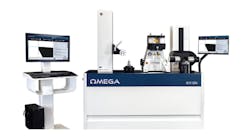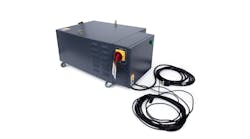A new survey of manufacturers finds leaders in those organizations are encouraged by the possibilities of Artificial Intelligence in their work, but they continue to be concerned about issues related to business resiliency, product quality, maximizing workforce potential, and sustainable growth. Industrial automation developer Rockwell Automation surveyed more than 1,500 businesses in 17 countries, gaging the role of “smart manufacturing” and how manufacturers perceive the value and of emerging technology and digitalization.
“A skilled workforce is the cornerstone of any successful manufacturing operation, but attracting, managing and retaining workers is proving to be an ongoing challenge,” stated Rockwell Automation SVP and CTO Cyril Perducat. “The survey found technology alone is not the answer.”
The ninth annual survey polled individuals working in consumer packaged goods, food & beverage, automotive, semiconductor, energy, life sciences, and other sectors, businesses ranging in size from $100 million to over $30 billion.
“To remain competitive, manufacturers need to focus their staff on embracing new technology as a core part of their evolving organizational culture, creating a technology/worker partnership that drives their business forward,” Perducat continued.
Among other survey findings, Rockwell determined that manufacturers believe Artificial Intelligence will drive the most significant results for their businesses, and 83% of manufacturers expect to use generative AI during 2024.
Among all of the survey respondents, 95% are using or evaluating smart manufacturing technology, an 11% increase on that metric from 2023.
Issues related to workforce management are highly correlated with smart manufacturing initiatives. Surveyed manufacturers are highly focused on maintaining and/or expanding their current workforces, and 94% of them plan to maintain or grow their workforce while adopting smart manufacturing technology adoption.
Among that segment of respondents there is a high emphasis on repurposing current workers to fill new roles in the “smart” organization. But they cited “change management” as their leading workforce-related obstacle in 2024.
Furthermore, one-third of survey respondents listed “matching technology and talent to business need” and “effectively managing people and resources” among the obstacles for their organizations over the next year.
As for their smart manufacturing expectations, most manufacturers identified “improved quality” as their top positive outcome – the same result as in 2023. Their most popular use case for smart manufacturing in 2024 is AI/Machine Learning.
“The workforce of 2019 is not coming back,” said Allison Kuhn, principal analyst, LNS Research, cited by Rockwell Automation. “Developing a sustainable workforce strategy is critical to successfully navigate daunting manufacturing challenges.”
The Rockwell Automation State of Smart Manufacturing Report is available for download.






